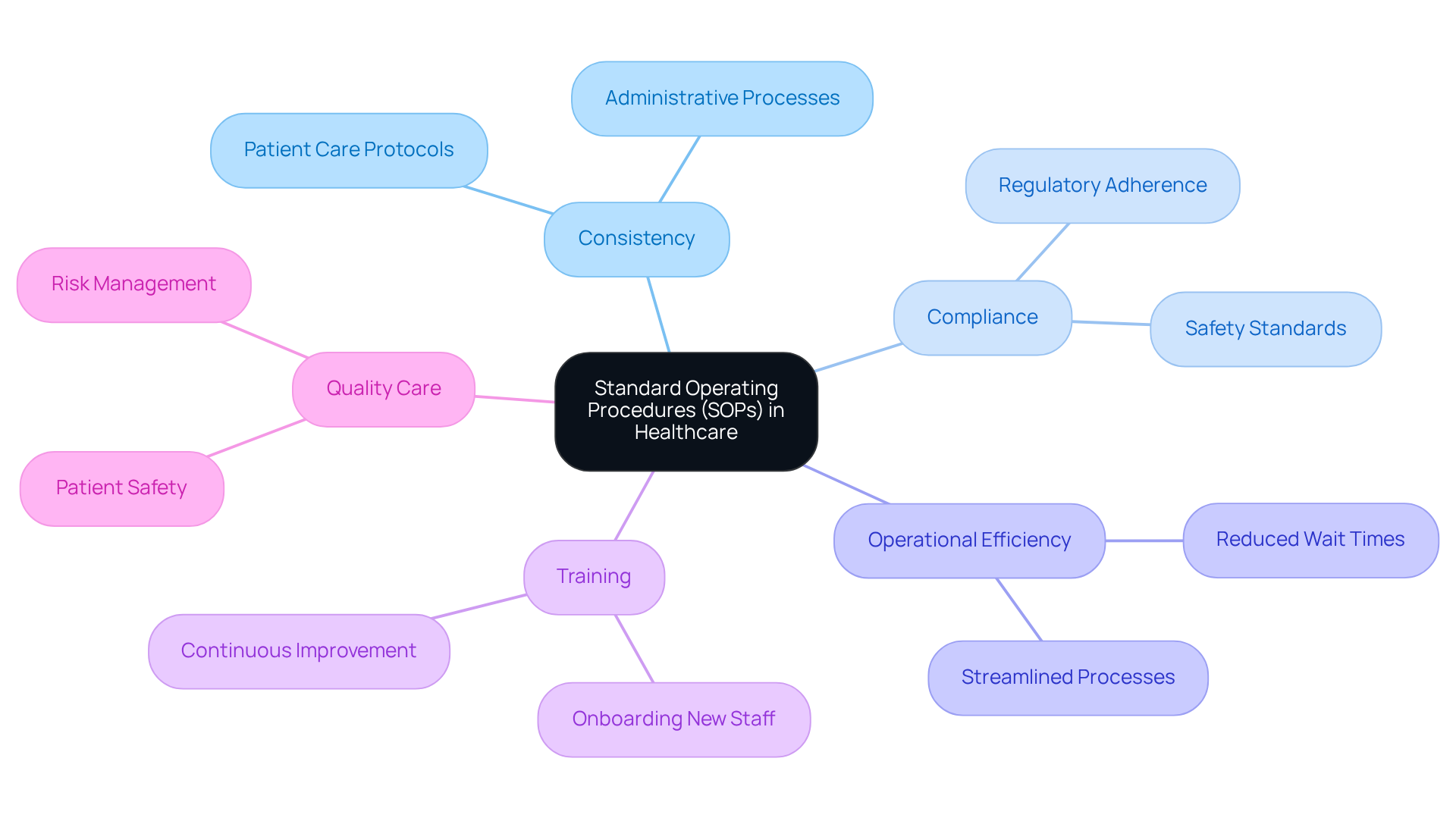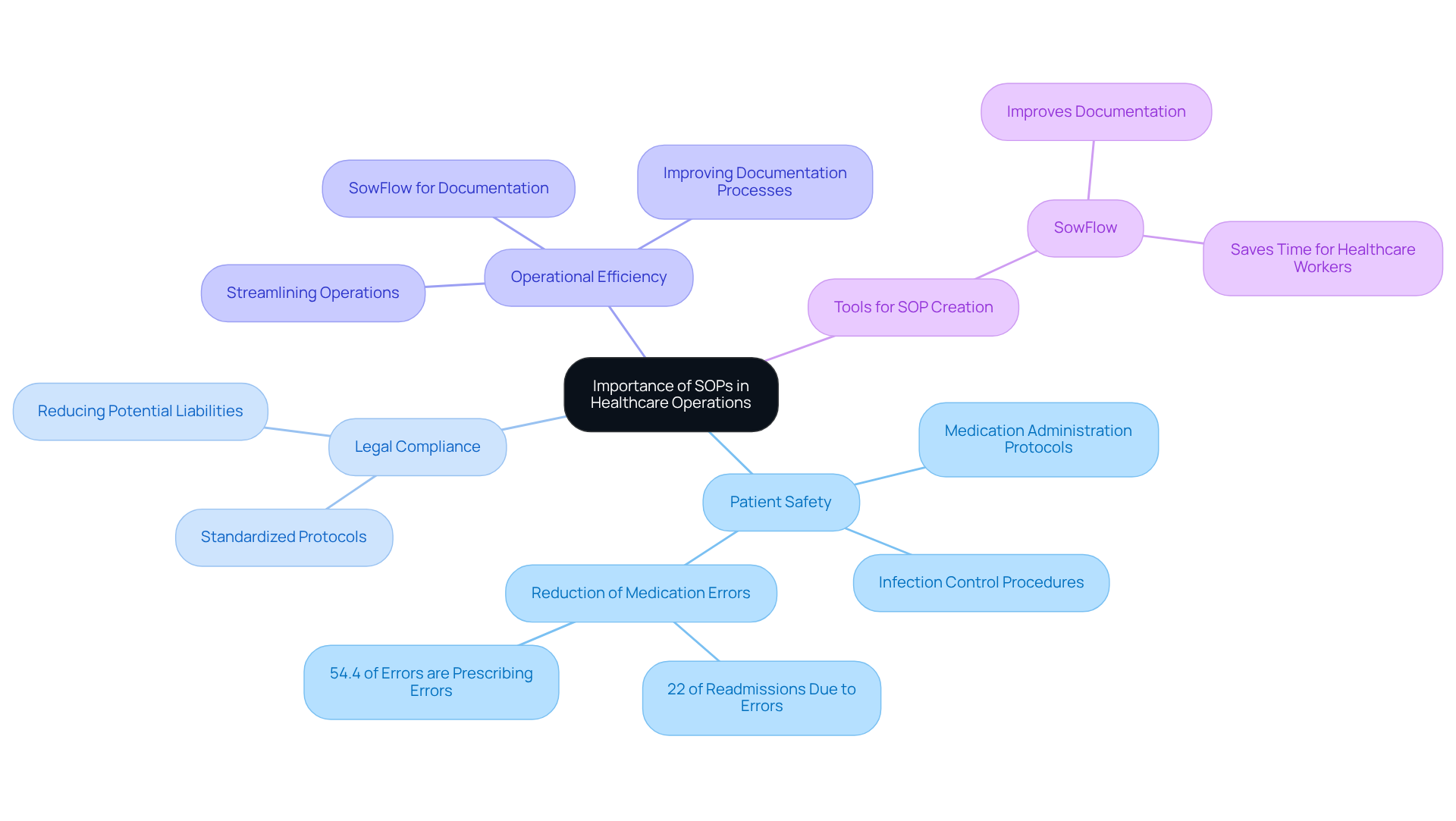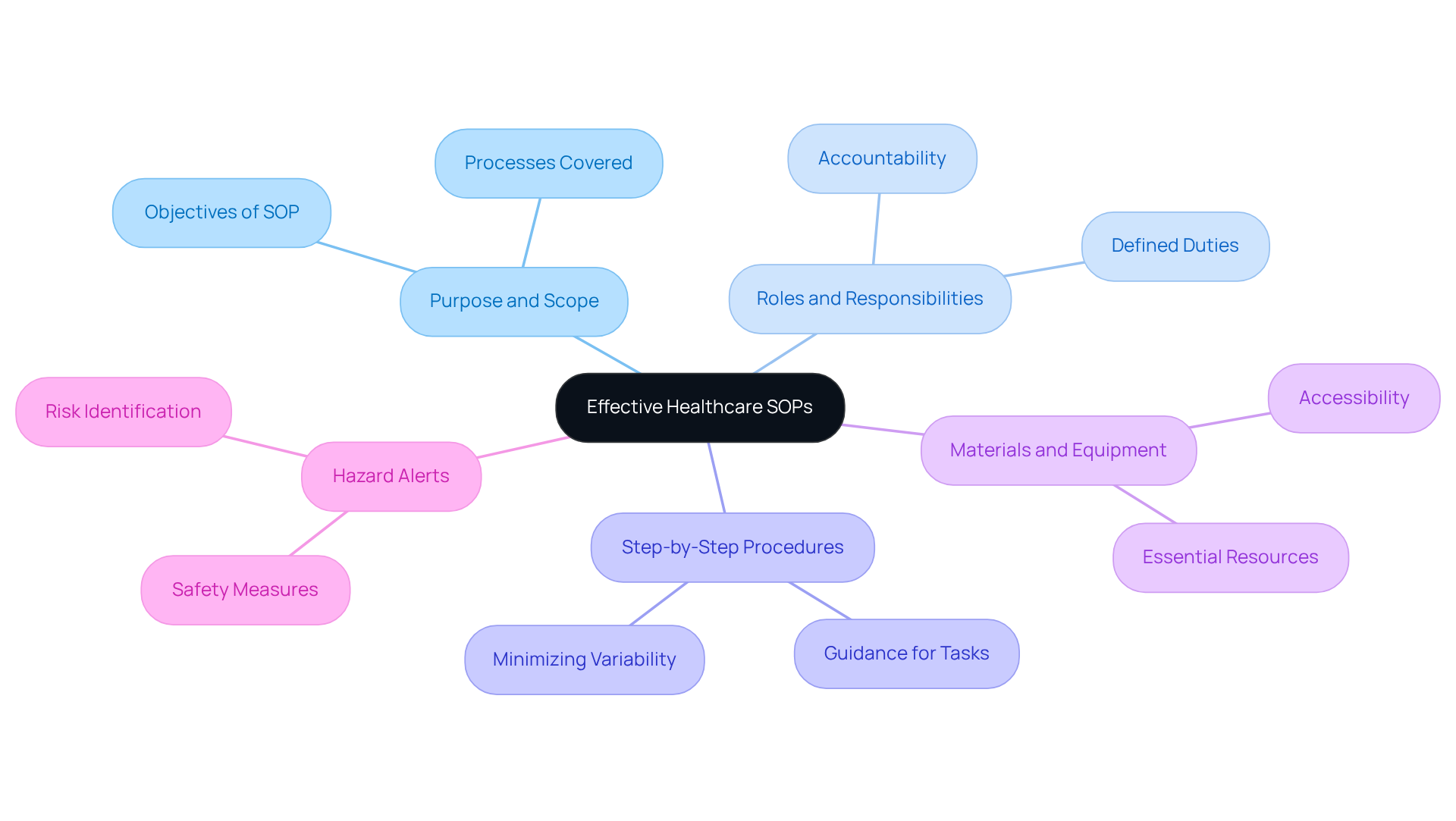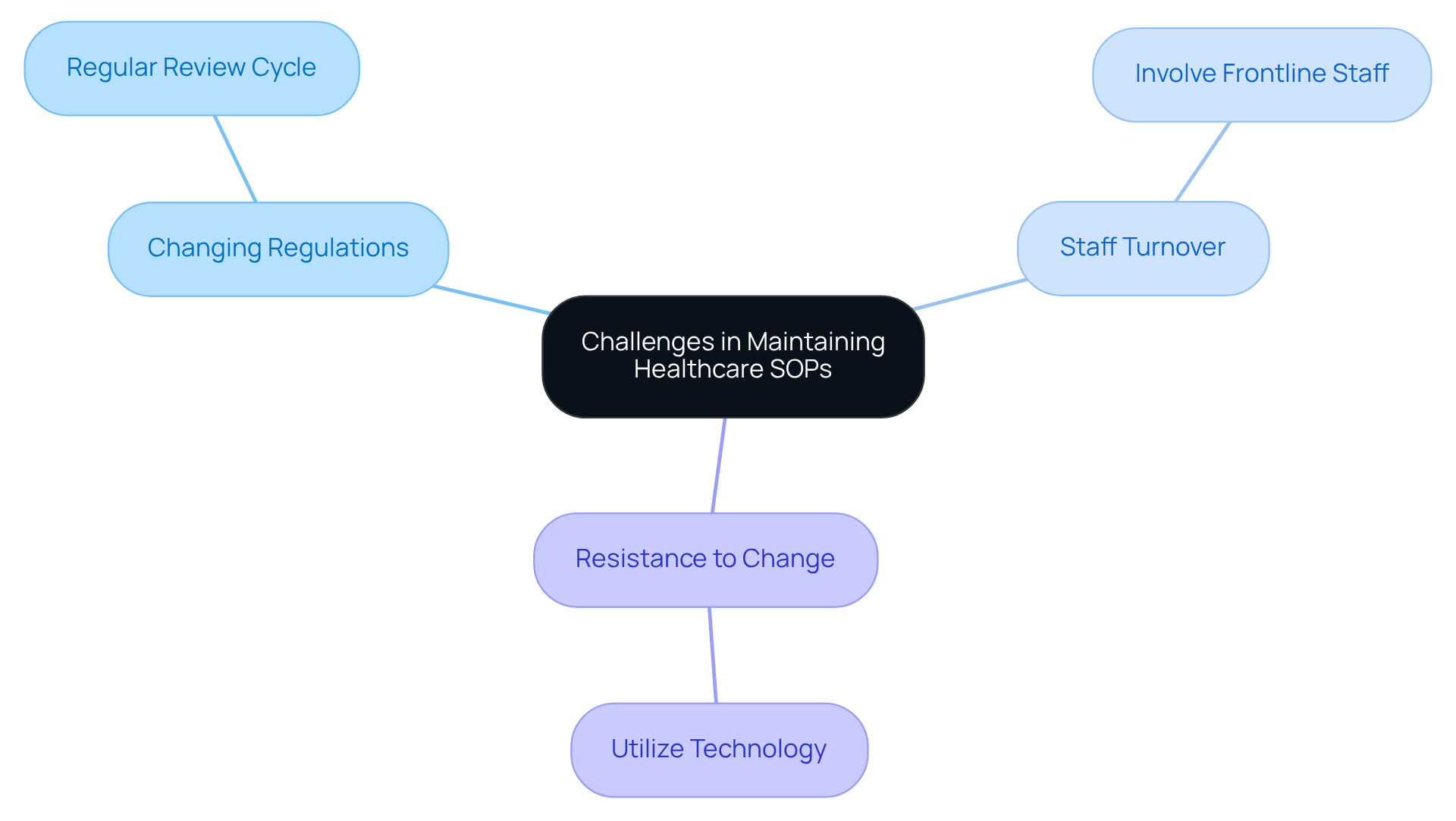
Automation and Documentation
|
October 16, 2025
|
Understanding SOP for Healthcare: Importance and Key Components
Overview
You might be wondering why Standard Operating Procedures (SOPs) are such a big deal in healthcare. Well, they’re absolutely crucial for ensuring that everything runs smoothly, safely, and with top-notch quality in both patient care and administrative tasks.
Think about it:
- When SOPs are in place, risks are reduced.
- Compliance improves.
- Operational efficiency gets a nice boost.
This all adds up to better patient outcomes and a more streamlined healthcare delivery process. So, let’s dive into why having effective SOPs is not just a good idea, but a game changer!
Key Highlights:
- SOPs are documented guidelines that ensure consistency in executing healthcare tasks, enhancing safety and quality.
- They cover a wide range of activities, from patient care protocols to administrative processes, reducing risks and improving compliance.
- Implementing SOPs can lead to shorter wait times and better patient flow in hospitals, especially during busy periods.
- SOPs help in maintaining continuity of care and training, capturing best practises even with staff turnover.
- Regular updates to SOPs are crucial for adapting to new clinical and regulatory demands, ensuring high-quality care.
- SOPs reduce medication errors, which account for 22% of hospital readmissions, thereby improving patient outcomes.
- Key components of effective SOPs include defined purpose, roles, step-by-step procedures, and hazard alerts.
- Challenges in maintaining SOPs include rapid changes in regulations, staff turnover, and resistance to change.
- Strategies to improve SOP maintenance include regular reviews, involving frontline staff, and utilising technology for documentation.
Introduction
You might be wondering, what exactly are Standard Operating Procedures (SOPs)? Well, they’re really the backbone of operational consistency in healthcare. Think of them as essential guidelines that help ensure safety and quality across various medical practices. By laying down clear protocols, SOPs not only boost patient care but also shield healthcare organizations from legal headaches and operational hiccups.
But here’s the catch: keeping these procedures up-to-date can be quite a challenge, especially with regulations changing faster than you can say 'healthcare compliance' and staff coming and going. So, how can healthcare providers effectively navigate these complexities? It’s all about maintaining high standards of care while being flexible enough to adapt to change. Now, let’s dive into how we can tackle this together!
Define SOPs in Healthcare: Key Concepts and Functions
You might be wondering what Standard Operating Procedures (SOPs) really are in the medical field. Well, they’re comprehensive, documented guidelines that help ensure consistency when executing specific tasks. Think of them as a trusty roadmap for medical professionals, guiding them to perform tasks safely and reliably. SOPs for healthcare encompass a wide range of activities—from care protocols for patients to administrative processes—and they play a crucial role in maintaining high standards of quality and compliance within healthcare organizations. By providing clear guidelines, these procedures help reduce risks, enhance safety for everyone involved, and keep all staff members on the same page.
Now, let’s dive into how executing these SOPs can truly boost operational efficiency and improve outcomes for patients. For instance, hospitals that have rolled out SOPs for patient intake during busy periods have seen significantly shorter wait times and better patient flow. Plus, adhering to industry regulations like HIPAA and OSHA becomes a breeze with well-documented procedures, which not only streamline processes but also ensure compliance with safety standards.
Healthcare specialists really get how important SOPs are in their daily work. Experts point out that these procedures capture best practices and essential methods, which means critical information stays within the organization, even when staff changes happen. This continuity is key for effective training and onboarding, helping new hires get up to speed and become productive faster. And let’s not forget, personalized SOPs tailored to the specific needs of medical service providers can really enhance their efficiency and relevance.
In summary, the SOP for healthcare is a vital tool. They don’t just standardize practices; they also foster a culture of safety and quality. Keeping them updated and adapting to new clinical and regulatory demands is crucial for maintaining high-quality care and ensuring patient safety. Consulting services, like those from Ignite Healthcare Solutions, emphasize the importance of regularly refreshing and improving SOPs to meet the latest industry standards. So, why not take a closer look at how you can enhance your own documentation practices?

Highlight the Importance of SOPs in Healthcare Operations
You might be wondering just how important SOP for healthcare is in the medical field. Well, they’re absolutely crucial! SOP for healthcare are essential for ensuring patient safety by laying out standardized protocols for critical tasks like medication administration and infection control. Plus, they serve as a SOP for healthcare organizations to stay on the right side of the law, reducing potential liabilities. By streamlining operations, these procedures act as a SOP for healthcare, boosting efficiency, cutting down on errors, and elevating the overall quality of care.
For instance, hospitals that have embraced thorough protocols have seen a real drop in medication errors. In fact, research shows that medication mistakes account for a whopping 22% of hospital readmissions! And it doesn’t stop there—organizations that prioritize sticking to SOPs have shown improved operational efficiency, with significant reductions in adverse events linked to non-compliance. It’s clear that the SOP for healthcare offers tangible benefits, not just for protecting individual health but also for enhancing healthcare delivery.
Now, let’s talk about how tools like SowFlow come into play. As Anastasia Masadi, a Product Owner, puts it, "SowFlow has been a game changer in the way we document work and deliver to our clients. I do not need to capture each screenshot individually, and do not even have to exit the browser while I am preparing procedures and training materials. SowFlow gave me time from my life back." This really highlights how SowFlow tackles the challenges of SOP creation, improving documentation processes and ultimately leading to better care quality and operational efficiency. So, what do you think? Could this be the solution to some of the documentation challenges you face?

Outline Essential Components of Effective Healthcare SOPs
You might be wondering what makes SOP for healthcare so important for efficiency. Well, they include several key elements that really help clarify and secure medical practices.
- Having a well-defined purpose and scope lays out the objectives of the SOP and specifies the processes it covers. This gives users a clear framework to work within.
- Defined roles and responsibilities are crucial; they ensure that every team member knows exactly what their duties are, which boosts accountability and operational efficiency.
Now, let’s talk about those detailed step-by-step procedures. They guide users through tasks, helping to minimize variability and errors in care delivery. And don’t forget about the essential materials and equipment—incorporating these guarantees that all the crucial resources are easily accessible. Hazard alerts also play a vital role by highlighting possible risks linked to specific procedures, keeping everyone safe.
For instance, think about a standard operating procedure for medication administration. It could outline crucial checks, like confirming individual identity and dosage, to avoid mistakes and improve care quality. Statistics show that organizations that implement an effective SOP for healthcare experience a notable decrease in medical mistakes, leading to better outcomes for individuals and heightened trust in medical systems. By establishing clear guidelines and responsibilities, medical providers can really foster a culture of safety and efficiency, ultimately enhancing the quality of care provided to patients.
So, how can you implement these practices in your own setting?

Identify Challenges in Maintaining Healthcare SOPs
You might be wondering about the challenges of keeping medical procedures efficient. One big hurdle is how quickly medical regulations and practices change, which can leave your SOP for healthcare feeling a bit outdated. Plus, when staff turnover happens, it can create inconsistencies in how well everyone follows those SOPs—new employees might not have the training they need. And let’s be honest, resistance to change can be a real roadblock when it comes to adopting updated procedures.
So, how can we tackle these issues? Healthcare organizations should consider:
- Implementing a regular review cycle for their SOP for healthcare.
- Involving frontline staff in the development process, as they know the day-to-day better than anyone else.
- Utilizing technology, such as a centralized documentation tool, to help keep those SOPs current and easily accessible.
Now, let’s dive into how these strategies can make a real difference.

Conclusion
You might be wondering why Standard Operating Procedures (SOPs) are such a big deal in healthcare. Well, they’re absolutely essential! Think of them as the structured guidelines that keep everything running smoothly and safely when it comes to patient care and administrative tasks. By laying down clear protocols, SOPs not only boost operational efficiency but also create a culture of safety and quality—something we all want in healthcare delivery.
Now, let’s talk about what makes SOPs so valuable. They help:
- Reduce risks
- Ensure compliance with regulations
- Make training new staff a breeze
It’s also super important to keep these procedures updated to keep up with the ever-changing clinical and regulatory landscape. Tailoring SOPs to meet the specific needs of healthcare providers is key. And don’t forget how technology can play a role here! Tools for documentation can really streamline SOP management and enhance overall healthcare quality.
In light of all this, it’s clear that healthcare organizations need to put SOP development and maintenance at the top of their to-do list. By embracing best practices and involving frontline staff in the creation and review of these procedures, organizations can tackle challenges head-on and ensure their SOPs stay relevant and effective. Ultimately, investing in solid SOP frameworks isn’t just about ticking a regulatory box; it’s about making a real commitment to delivering top-notch care to patients.
Frequently Asked Questions
What are Standard Operating Procedures (SOPs) in healthcare?
SOPs in healthcare are comprehensive, documented guidelines that ensure consistency in executing specific tasks. They serve as a roadmap for medical professionals to perform tasks safely and reliably.
What types of activities do SOPs cover in healthcare?
SOPs cover a wide range of activities, including care protocols for patients and administrative processes, playing a crucial role in maintaining quality and compliance within healthcare organizations.
How do SOPs improve operational efficiency in healthcare settings?
Implementing SOPs can lead to operational efficiency by reducing wait times and improving patient flow, particularly during busy periods, such as patient intake in hospitals.
How do SOPs help with compliance in healthcare?
Well-documented SOPs streamline processes and ensure compliance with industry regulations like HIPAA and OSHA, making it easier for healthcare organizations to adhere to safety standards.
Why are SOPs important for training and onboarding new staff?
SOPs capture best practices and essential methods, ensuring that critical information remains within the organization even with staff changes. This continuity aids in effective training and helps new hires become productive faster.
Can SOPs be personalized for specific healthcare providers?
Yes, personalized SOPs tailored to the specific needs of medical service providers can enhance their efficiency and relevance in practice.
What role do SOPs play in fostering a culture of safety and quality in healthcare?
SOPs standardize practices and promote a culture of safety and quality by ensuring that procedures are consistently followed, which is crucial for maintaining high-quality care and patient safety.
Why is it important to keep SOPs updated?
Regularly updating SOPs is essential to adapt to new clinical and regulatory demands, ensuring that healthcare practices meet the latest industry standards and maintain high-quality care.
👍
What others are liking
5 Steps to outline your ideal documentation structure
5 MINS READ
Where to start the your journey of mapping out your ideal documentation structure, aligning it with the very heartbeat of your organization?
Defining a winning level of detail in your process
3 MINS READ
What is too much detail, and what is too little? This article described in that winning level detail about what detail is enough.





